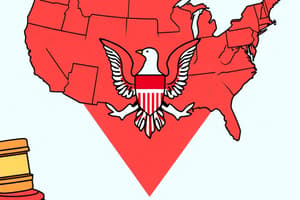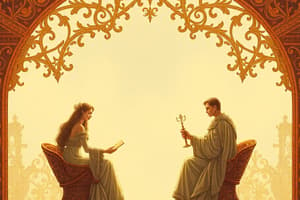Podcast
Questions and Answers
What does Locke mean by 'a state of liberty' in the state of nature?
What does Locke mean by 'a state of liberty' in the state of nature?
In the state of nature, human beings are free but not free to do whatever they want. State of liberty is basically being free to do whatever you like, so long as it doesn't hurt others.
What rights did Locke believe we have in the state of nature?
What rights did Locke believe we have in the state of nature?
Right to life, liberty and property. Right to protect yourself, right to property, right to join a community, right to form government, right to life, right to law, right to property, right to execute law.
According to Locke, what is prohibited in the state of nature?
According to Locke, what is prohibited in the state of nature?
Suicide, hurting another's property or self, and liberty to destroy oneself.
What is the chief end of political society, according to Locke?
What is the chief end of political society, according to Locke?
According to Locke, who enforces the law in the state of nature?
According to Locke, who enforces the law in the state of nature?
What rights are considered "inalienable" in the Declaration of Independence?
What rights are considered "inalienable" in the Declaration of Independence?
What was a major element of the Articles of Confederation?
What was a major element of the Articles of Confederation?
Under the Articles of Confederation, each state had proportional representation in the national legislature based on its size and population.
Under the Articles of Confederation, each state had proportional representation in the national legislature based on its size and population.
Which of the following was a limitation of the congressional powers under the Articles of Confederation?
Which of the following was a limitation of the congressional powers under the Articles of Confederation?
Amending the Articles of Confederation required a simple majority vote in the national legislature.
Amending the Articles of Confederation required a simple majority vote in the national legislature.
According to Madison, who is to blame for the 'vices of the political system'?
According to Madison, who is to blame for the 'vices of the political system'?
What were the key features of the Virginia Plan presented at the Constitutional Convention?
What were the key features of the Virginia Plan presented at the Constitutional Convention?
Which plan proposed a unicameral legislature with equal representation for each state?
Which plan proposed a unicameral legislature with equal representation for each state?
According to Brutus I, what are the advantages of a small republic?
According to Brutus I, what are the advantages of a small republic?
According to Brutus I, what is the disadvantage of a large republic?
According to Brutus I, what is the disadvantage of a large republic?
According to Federalist No. 10, what is the cause of faction?
According to Federalist No. 10, what is the cause of faction?
According to Federalist No. 10, what is the solution to the problem of faction?
According to Federalist No. 10, what is the solution to the problem of faction?
According to Federalist No. 51, what is the most dominant branch in a republic government?
According to Federalist No. 51, what is the most dominant branch in a republic government?
According to Federalist No. 51, what is the basis for checks and balances?
According to Federalist No. 51, what is the basis for checks and balances?
According to Eakin v. Raub, what arguments does Justice Gibson make against Judicial Review?
According to Eakin v. Raub, what arguments does Justice Gibson make against Judicial Review?
According to Federalist 78, what does Hamilton think about the Judiciary and its power?
According to Federalist 78, what does Hamilton think about the Judiciary and its power?
How do most cases reach the Supreme Court?
How do most cases reach the Supreme Court?
What are the three levels of the Federal Judiciary?
What are the three levels of the Federal Judiciary?
Who creates the inferior courts?
Who creates the inferior courts?
What is the jurisdiction of the Supreme Court?
What is the jurisdiction of the Supreme Court?
Who are all the major actors in the case Marbury v. Madison?
Who are all the major actors in the case Marbury v. Madison?
What is a writ of mandamus?
What is a writ of mandamus?
What law was declared unconstitutional in this case?
What law was declared unconstitutional in this case?
According to Boerne v. Flores, what was the court's decision?
According to Boerne v. Flores, what was the court's decision?
According to Boerne v. Flores, what is RFRA and how did Congress run afoul of the Constitution?
According to Boerne v. Flores, what is RFRA and how did Congress run afoul of the Constitution?
What is the 'strict scrutiny test'?
What is the 'strict scrutiny test'?
According to Scalia, what is formalism?
According to Scalia, what is formalism?
According to Scalia, what is his opinion on flexibility and living constitutionalism?
According to Scalia, what is his opinion on flexibility and living constitutionalism?
Flashcards
Locke's State of Nature
Locke's State of Nature
State of liberty, but not license. Freedom is limited by the rights of others.
Locke's Natural Rights
Locke's Natural Rights
Life, liberty, and property (or pursuit of happiness).
Prohibited in Nature (Locke)
Prohibited in Nature (Locke)
Suicide or harming self/others/property.
Chief End of Political Society
Chief End of Political Society
Signup and view all the flashcards
Enforcement in Nature (Locke)
Enforcement in Nature (Locke)
Signup and view all the flashcards
Declaration of Independence (Core Idea)
Declaration of Independence (Core Idea)
Signup and view all the flashcards
Articles of Confederation
Articles of Confederation
Signup and view all the flashcards
State Sovereignty (Articles)
State Sovereignty (Articles)
Signup and view all the flashcards
Unicameral Legislature (Articles)
Unicameral Legislature (Articles)
Signup and view all the flashcards
No Executive Branch (Articles)
No Executive Branch (Articles)
Signup and view all the flashcards
No National Judiciary (Articles)
No National Judiciary (Articles)
Signup and view all the flashcards
Limited Congressional Powers (Articles)
Limited Congressional Powers (Articles)
Signup and view all the flashcards
No Power to Tax (Articles)
No Power to Tax (Articles)
Signup and view all the flashcards
Unanimous Amendment Process (Articles)
Unanimous Amendment Process (Articles)
Signup and view all the flashcards
No Regulation of Commerce (Articles)
No Regulation of Commerce (Articles)
Signup and view all the flashcards
Military Limitations (Articles)
Military Limitations (Articles)
Signup and view all the flashcards
Madison's Blame (Political System)
Madison's Blame (Political System)
Signup and view all the flashcards
Virginia Plan
Virginia Plan
Signup and view all the flashcards
New Jersey Plan
New Jersey Plan
Signup and view all the flashcards
Hamilton Plan
Hamilton Plan
Signup and view all the flashcards
Cause of Faction (Federalist 10)
Cause of Faction (Federalist 10)
Signup and view all the flashcards
Solution to Faction (Federalist 10)
Solution to Faction (Federalist 10)
Signup and view all the flashcards
Examples of Factions (Federalist 10)
Examples of Factions (Federalist 10)
Signup and view all the flashcards
Ways to 'Remove' Causes of Faction
Ways to 'Remove' Causes of Faction
Signup and view all the flashcards
Dominant Branch in Republic
Dominant Branch in Republic
Signup and view all the flashcards
Basis for Checks and Balances
Basis for Checks and Balances
Signup and view all the flashcards
Gibson's Argument Against Review
Gibson's Argument Against Review
Signup and view all the flashcards
Judicial Review (Democratic)
Judicial Review (Democratic)
Signup and view all the flashcards
Hamilton's View of Judiciary
Hamilton's View of Judiciary
Signup and view all the flashcards
Appellate Jurisdiction
Appellate Jurisdiction
Signup and view all the flashcards
Study Notes
- Exam 1 Review covering Locke, Declaration of Independence, Articles of Confederation, Vices of the Political System, Constitutional Convention Plans, Brutus I, Federalist 10, Federalist 51, Eakin v. Raub, Federalist 78, Federal Judiciary, Marbury v. Madison, Boerne v. Flores, and Scalia
Locke
- In the state of nature, human beings are free, but not free to do whatever they want
- State of liberty: Freedom to do as desired as long as it doesn't harm others
- Absence of license: Cannot do whatever you want
- Locke's rights in the state of nature: Right to life, liberty, and property
- Also includes the right to protect yourself, right to property, right to join a community, right to form government, right to law, and right to execute law
- Prohibited actions in the state of nature: Suicide, hurting others' property or self, and liberty to destroy oneself
- The chief end of political society involves preservation of property (rights), known and settled law, a law giver (legislative power), an indifferent judge (adjudication judge), and executing the law (executive)
- Property preservation relies on government
- In the state of nature, human beings enforce the law, and reason is the law; everyone has the right to execute the law
Declaration of Independence
- Key point: When a group decides to break away and form an independent nation, they should explain their reasons as laws of nature and basic human rights entitle them to this freedom
- Belief in obvious truths include that all people are created equal and have inalienable rights given by their Creator, which cannot be taken away, including the rights to life, liberty, and the pursuit of happiness
- Governments are created to protect these rights and get their power from the consent of the governed
- When a government becomes oppressive and stops protecting these rights, the people can change or abolish it and create a new government to ensure their safety and well-being
- Inalienable rights include life, liberty, and the pursuit of happiness
Articles of Confederation
- Ratified in 1781
- Established a loose confederation of states with a weak central government
- State sovereignty: Each state retained its independence and had most of the power
- Unicameral legislature: Single-house congress where each state had one vote, regardless of size or population
- No executive branch: No president or national leader to enforce laws
- Congress could make decisions but had no way to carry them out or enforce laws
- No national judiciary: No federal court system; disputes between states settled by state courts
- Limited congressional powers: Congress could declare war, conduct foreign affairs, and make treaties
- It could not levy or regulate trade, or tax: had to ask states for money, but states were not required to contribute
- Resulted in a weak, underfunded government
- Unanimous amendment process: Any changes required all states to agree, nearly impossible to fix problems
- No regulation of commerce: States could impose tariffs on each other and had their own trade policies, leading to economic disputes
- Military limitations: Congress could raise an army but relied on states to provide troops, making national defense unreliable
Vices of the Political System
- James Madison blamed representative bodies and the people themselves
Plans from the Constitutional Convention
- Virginia Plan (National Plan)
- Proposed by James Madison
- Favored large states
- Advocated for a bicameral legislature and a national government
- New Jersey Plan (Federal Plan)
- Proposed by William Paterson
- Favored small states
- Advocated for a unicameral legislature and equal representation
- Hamilton Plan
- Proposed by Alexander Hamilton
- Favored a strong central government, bicameral legislature, and president serving for life
Brutus I
- Three main things gained through a small republic are that people know their representatives, people are of lesser fortunes and more moderate, and less disagreement occurs as the republic matches the will of the people
- Disadvantages of a large republic include that states have reduced power over time
- The powers of the courts are too extensive, discordant principles exist, and less citizenry is present
Federalist 10
- The cause of faction is liberty and differing opinions
- Solutions to the problem of faction involve removing the causes of factions and controlling the effects of factions
- Must extend the republic to the whole 13 states
- Examples of factions Madison describes include landowners, non-landowners, creditors, and debtors
- Ways to remove the causes include destroying liberty, and the purpose of government is to defend liberty as well as give everyone the same opinion
Federalist 51
- The most dominant branch in a republic government is the legislative branch
- Represents the people; it controls funding; it can override the executive
- The basis for checks and balances is human nature and the need to prevent any one branch from becoming too powerful
Eakin v. Raub
- Arguments Justice Gibson makes against judicial review include that it gives the Judiciary too much power, the people should correct legislative mistakes, separation of powers should limit the Judiciary, and it is not explicitly granted by the constitution
- Legislative supremacy is more democratic
Federalist 78
- Hamilton thinks the constitution is fundamental law and the power of the people is superior in considering the judiciary and its power
- He defends judicial review by stating the law says no slavery and we need slavery
- Constitution is superior, paramount, fundamental, the will of the people is properly expressed in the constitution as opposed to ordinary legislature, repugnant to the constitution is null and void
Federal Judiciary
- Most cases reach the Supreme Court through a writ of certiorari: orders a lower court to deliver its record in a case so that the higher court may review it
- Three levels of the federal judiciary: U.S. Supreme Court, U.S. Court of Appeals, and U.S. District Courts
- Congress creates the inferior courts
- Jurisdiction of the Supreme Court includes cases in which the U.S. is a party, cases involving violation of the U.S. Constitution or federal laws, cases between citizens of different states if the amount in controversy exceeds $75,000, cases involving bankruptcy, copyright, patent, maritime law, and subject matter jurisdiction
Marbury v. Madison
- Major actors include John Adams (Federalist, nationalist, pro-Judiciary) making "midnight appointments," William Marbury whose commission was not delivered, John Marshall (becomes Secretary of State and does not issue the commission), and Thomas Jefferson (Democrat-Republican, skeptical of the court, new president)
- A writ of mandamus is a court order to an official in government to carry something out
- Questioning the court asking the president James Madison to hand over his commission
- Marshall interprets the jurisdiction: A court would have to issue a writ of mandamus under jurisdiction
- The court’s original jurisdiction is based on fact and law except in cases involving ambassadors and states as a party
- The original jurisdiction leads the court to decide that this case would fall under original jurisdiction
Boerne v. Flores
- The court's decision: RFRA is out of proportion and trying to change the constitution
- RFRA is congress passing RFRA under the 14th Amendment, congress can enforce this, wanting to super protect religious exercise by passing a federal statue that says the supreme court has to use strict scrutiny in free exercise cases, and how congress runs afoul of the constitution
- RFRA is trying to change the way that the court is going to determine the law, it is changing the 14th Amendment
- Constitutions should not be changed by ordinary means
- The "test" is referred to as RFRA is a strict scrutiny test - a form of judicial review that courts use to determine the constitutionality of certain laws; the government better have a really good reason for infringing on freedoms
Scalia
- Formalism, regarding Scalia, means Judges should follow the law and not personal preferences
- It can be understood as textualism in statutory interpretation, originalism in constitutional interpretation, criticism of pragmatism and judicial discretion, and a famous defense of formalism
- Flexibility and living constitutionalism undermines democratic legitimacy
- Flexibility should come from the amendment process, not Judges
- A living constitution leads to judicial activism
- The originalist alternative: Fixed meaning
- Criticism of "evolving standards" in Supreme Court decisions
Studying That Suits You
Use AI to generate personalized quizzes and flashcards to suit your learning preferences.




